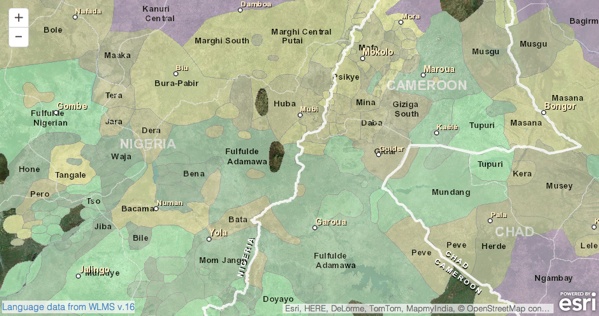What is Langscape?
Langscape is an ambitious project to increase understanding of language diversity, through visualization and aggregation of knowledge. Langscape is a geographical information system (GIS), providing an interactive map of around 6400 languages worldwide. But the map is just the start. The map links to detailed information about each language, integrating information from many different data resources. This includes information about demographics, language families, sound systems, bibliographies and expertise, plus raw sound and text materials. Langscape does not seek to compete with existing language database projects, which reflect deep expertise and many years of effort in specific regions, language types, or levels of analysis. Instead, Langscape seeks to make these resources more visible by making their contributions more accessible and sustainable. Langscape is coordinated by the
Maryland Language Science Center, but it reflects contributions from many individuals and organizations.

Langscape’s initial ‘soft’ public release was in May 2014, and a substantially improved version was released in September 2014. Significant further enhancements are due for release during 2014-2015. Langscape has been a development project of the Language Science Center since January 2014, building on earlier work done by UMD’s
Center for Advanced Study of Language, which contributed much data, especially on language diversity in Africa. Langscape is currently funded as a collaboration between the University of Maryland and the US Government. Future developments will include much new functionality, particularly for querying and for user-contributed data and map-layers.
Making data discoverable
Our goal is to aggregate language data of many types that can be used for many different purposes in research, education, technology, government and beyond. Currently, the language information which can be accessed through Langscape includes: data collected by researchers at the
Center for Advanced Study of Language; some publicly available data sets; and data collected and/or hosted by our various
Partners. We will soon enable a mechanism for smaller organizations and individuals to create accounts and add data to Langscape. Many valuable language resources are collected and owned by native speakers, language teachers, community language programs, cultural organizations, and others, and we hope to help make these resources accessible to a wider audience.
Langscape's worldwide map can make your language data highly visible. If you are interested in contributing to Langscape more information can be found
here.
Other Langscapes
Our name is shared by the following groups and websites, though we are not affiliated with them:
 Langscape’s initial ‘soft’ public release was in May 2014, and a substantially improved version was released in September 2014. Significant further enhancements are due for release during 2014-2015. Langscape has been a development project of the Language Science Center since January 2014, building on earlier work done by UMD’s Center for Advanced Study of Language, which contributed much data, especially on language diversity in Africa. Langscape is currently funded as a collaboration between the University of Maryland and the US Government. Future developments will include much new functionality, particularly for querying and for user-contributed data and map-layers.
Langscape’s initial ‘soft’ public release was in May 2014, and a substantially improved version was released in September 2014. Significant further enhancements are due for release during 2014-2015. Langscape has been a development project of the Language Science Center since January 2014, building on earlier work done by UMD’s Center for Advanced Study of Language, which contributed much data, especially on language diversity in Africa. Langscape is currently funded as a collaboration between the University of Maryland and the US Government. Future developments will include much new functionality, particularly for querying and for user-contributed data and map-layers.